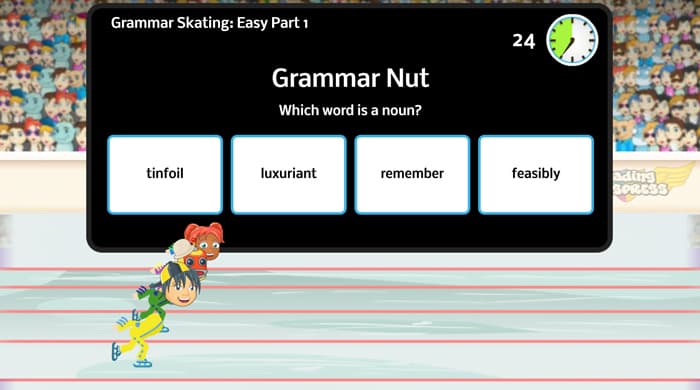


5 Fun Grammar Games for Kids

Try these fun grammar games at home and discover hundreds of online grammar games in Reading Eggs. Free trial
Helping children learn the rules of English grammar can be a struggle. Grammar can be difficult, even for most grownups!
But the good news is that learning grammar doesn't always have to end in frustration. With a few fun and creative tricks up your sleeve, you can help your child navigate the twists and turns of English grammar with confidence, enthusiasm and ease. Here are five fun activities you can try together at home.
Play fun online grammar games for FREE!
Reading Eggs and Reading Eggspress make learning grammar, vocabulary and comprehension skills fun for young kids. The programme includes hundreds of interactive reading lessons, grammar activities and over 3000 e‑books for children to enjoy.
1. Sentence building game
You will need eight differently coloured pencils or pens, one sheet of paper and some index cards. On your sheet of paper, write down eight most common parts of speech, and go over them with your child. These include: nouns, verbs, adverbs, adjectives, pronouns, prepositions, conjunctions and interjections. Then place a colour code against each of the eight parts of speech using your pencils or pens.
On your index cards, ask your child to help you think of and write down 10–20 words for each category. Try to stick with adverbs that end in –ly, which are easier for most children to work with. Write only one word on each card using the correct colour that matches your colour code. Group your cards by category/colour and place them facing down on a hard surface. Ask your child to pick out one word from each group and use those words to build a sentence. For younger children, it's best to start with just nouns, verbs and adjectives, and then slowly introduce other parts of speech as they gain more confidence. If you play this game regularly, try to stick to using the same colour code each time to help your child remember specific parts of speech by associating them with colours.
2. Spot the mistakes
Editing text for spelling and grammatical mistakes can be turned into a fun challenge for your child. Write one or two paragraphs down on a sheet of paper. Try to write something that your child would be interested in reading, or may find amusing or funny. As you write, include a single spelling or grammatical mistake in every two or three sentences. This may include putting an apostrophe or comma in the wrong place, misusing a question mark, or including common spelling mistakes that many children (and adults!) get wrong (e.g. there instead of their or they're, alot instead of a lot, untill instead of until).
Give your child a red pencil or pen to spot the mistakes and mark them on the paper – just like a teacher would. Most children will enjoy this playful role‑reversal and may even give you an overall score for effort!
3. Play the Simon Says of grammar
Many children respond best to a multi‑sensory approach to learning. Actions and movement while learning can help cement conceptual understanding. A great game to play with your child involves allocating a different action for each part of speech. For example, your child can place their hands on their head for a noun (e.g. table or shoe), jump on the spot for a verb (e.g. run or play), or touch the tip of their nose for an adjective (e.g. cold or funny). Once your child has rehearsed each action a few times, call out a word and ask them to do the correct action. This game can be a lot of fun with siblings, a group of friends, or the whole family. If you're playing in a group, encourage each player to do the actions as quickly as possible, with the fastest person winning the game – a similar concept to playing Simon Says!

Reading Eggspress includes hundreds of fun online literacy games. The Stadium is where children can enjoy multi‑player games that build essential grammar, spelling and vocabulary skills. Free trial
4. Cap‑ital letters
This game is best played with three or more people, including one reader. You will need one cap for each player and a short picture book, story or simple song lyrics to read aloud. Explain that players will need to put on their cap each time they hear where a capital letter may be needed. To get the most out of this activity, choose texts that include short sentences that are easy to hear, and also include a handful of proper nouns (e.g. Jane, London, New York) and proper adjectives (e.g. Australian, English, Chinese). You can start the game by carefully reading each sentence of your text aloud. Every time a capital letter is needed, the players should signal by putting their caps on their heads. Remember to use the appropriate expressions while reading (e.g. placing emphasis on exclamation points, question marks, pauses, and doing voices for different characters) and encourage other players to do the same.
5. Present and past tense matching game
This game is a fun way to help your child reinforce their understanding of present and past verb tenses. Using index cards and a pen or pencil, write the past and present verb tenses of different words, with one word on each card. Some examples include: jump and jumped, see and saw, play and played, run and ran. Use a blue pen or pencil to write present tense verbs and red to write past tense verbs, so that each set of matching words has one blue word and one red.
Mix up your cards and put them into a hat. Invite your child to pick out the cards one by one and read each word aloud. Once a card has been read aloud, place them face‑up on a hard surface. When the hat is empty, ask your child to match each blue card to the correct red card.
Play fun online grammar games for FREE!
Reading Eggs and Reading Eggspress make learning grammar, vocabulary and comprehension skills fun for young kids. The programme includes hundreds of interactive reading lessons, grammar activities and over 3000 e‑books for children to enjoy.




